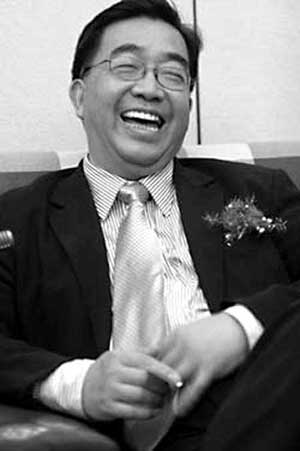| Tools: Save | Print | E-mail | Most Read |
| Late Painter's Legacy Continues on Film |
| Adjust font size: |
The Music Box, a feature story of enduring love between a barber and a bar singer against all odds, will be screened in major cinemas nationwide at the end of this month. This comes a full year and three weeks after the sudden death of its director, the late Chinese oil painter Chen Yifei. The crew was able to continue what Chen left behind, thanks to Ng See-yuen, a leading Hong Kong film director/producer/scriptwriter, best known for his contribution to Dragon Inn (1992) and The Soong Sisters (1997). Ng, also a major investor in the film, took the helm and kept his loyalty to Chen's artistic style. Chen Yifei (1946-2005), a Zhejiang-born artist who went to further his studies in the United States in 1981, soon rose to critical acclaim when his works were displayed in galleries and museums in the United States, Britain, France and Japan. Chen started making movies in 1993. "Chen's talent was not only shown on the canvas; he turned the silver screen into a moving canvas," said Wu Yigong, a renowned film director and vice-chairman of the All-China Federation of Literary and Art Circles.
The preview of The Music Box on Sunday at the Shanghai Film Center moved many viewers to tears. "From the high-angle scene of the barber shop in the watery town, the audience is able to savor the unique beauty that Chen created," said Gu Chunyan, a renowned local painter and Chen's good friend. Gu said that Chen had told him that he always wanted to create an ambience in which the viewer would see scenes which are both "strange" and "familiar." The viewer can easily perceive Chen's profound love for watery towns, which are similar to his hometown Zhenhai in Ningbo, Zhejiang Province, Gu explained. There is also Chen's deep sympathy for the fate of women, starting with his first film The Bygone Dreams of Shanghai (1993). Chen used the metaphor of a painter seeking a beautiful lover in his hometown to express his love for Shanghai and women, Gu said. Chen, as well Ng, achieved what Chen originally set out to do, Gu added. Emotional story How Chen sacrificed his life to shoot the film is an emotional story of its own. This has now been made into a television documentary shown this week on the OTV (Oriental Television) Channel in Shanghai. From the footage, the viewer sees Chen faint on location in Hangzhou, in Zhejiang Province, on April 8 last year. He was immediately rushed to the Huashang Hospital where he died on April 10.
Gu explained, "The film is just like the razor held in the right hand of the barber, cutting Chen's throat. Chen died for it because of overwork and exhaustion." Chen Yiming, Chen Yifei's younger brother, noted, "My brother spared no effort to capture almost every beautiful detail to produce a 'familiar/strange' effect." Chen Yiming added that Chen Yifei would even do the make-up for the extra actors in the movie himself, quoting the artist as saying, "Don't treat the audience like nuts. They know what beauty is." Chen was overly tenacious for the beautiful details, a woman film director said after the preview. He overworked himself so much to pursue the perfection, and it was this that resulted in his sudden death. But TV viewers also feel uplifted as they follow how Ng and the crew followed in Chen's footsteps and enabled Chen's style and work to continue. On the second day after Chen's death, Ng took over the direction, as the art executive for the film. "With the screening of The Music Box, Chen Yifei will come alive on the big screen," Ng said. The Music Box ends with Chen's words: "I wish you, the audience will remember me and remember I have shot such a film as The Music Box." Although the film might not be Chen's best film, it is surely the most unforgettable, said Ren Zhonglun, president of the Shanghai Film Group. (China Daily April 13, 2006) |
| Tools: Save | Print | E-mail | Most Read |
 |
| Related Stories |
|
|
Product Directory China Search |
Country Search Hot Buys |

